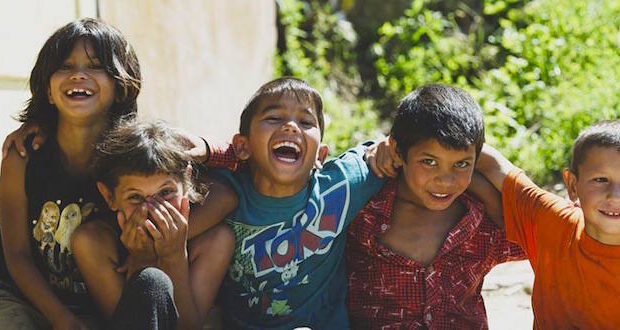Across Slovakia’s countryside, castles have dominated the landscape for a thousand years, boasting of power, wealth, and luxury. At their feet, sleepy villages rest in lush valleys. Small chapels marked by crosses and images of saints dot the roads, reminders of long-ago days when medieval travelers stopped to rest and pray. But beyond the mountains, a complex tale has been playing out for decades. It is the story of the Roma people — the Gypsies. Deeply marginalized by larger society, the Roma have suffered greatly.
Yet for 20 years, an unprecedented revival has been growing among Slovakia’s Roma. Church leaders and members alike agree — only God could bring this about.
Since the formation of an embryonic Roma church fellowship in Sabinov, Slovakia, in 2000, the revival has gained momentum and spread to the unlikeliest of places.
“We have never seen anything like it. No one can take credit for starting it,” say Jim and Sherry Sabella, Assemblies of God World Missions area directors for Southeast Europe. “Christ the King has gone into the highways and byways, inviting whosoever will to come to His table. The Roma are coming in droves.”
Though compelled by the coronavirus pandemic to cancel the anniversary celebration planned for 2020, Roma church leaders Marian, Rinaldo, Marek, and Tibor rejoice in God’s miracles in their communities and lives.
FOUNDATIONS
In 2007, the construction of a building for Sabinov Gypsy Church began. Miraculously they were granted government permission to begin, but many hurdles were faced in the process.
Marian describes some of the challenges. “While many are thankful for what God is doing among us, we do also face opposition from those who are blind and do not want to see what God is doing,” he says. “Sometimes people will not help us or serve us in restaurants because we are Roma. So, we teach our children that we overcome such things with the love of our God and the testimony of our lives.”
Despite all forms of opposition, by 2009 the building was completed with no debt, and has continued to expand. Today Sabinov Gypsy Church stands as the physical birthplace of a revival among the Roma in the neighborhood, the country, and the continent.
A PROVEN PATTERN
The Roma community in Sabinov, like Roma communities across Europe, traditionally endured many problems. Unemployment, alcoholism, sexual abuse, violence, theft, and few education opportunities were rampant.
Yet as the Lord began to pour out His presence through the church, crime rates began to drastically fall. Police and local authorities took notice, soon partnering gladly with the church.
Over the years, the pattern has proven itself: Roma who come to Christ experience and consciously engage in dramatic life transformations.
Substance abuse, homosexuality, and addictive, destructive patterns are defeated, Marian states. Homes, though humble and often in squalid settlements, are cleaned and kept immaculate. Hygiene improves. Begging and thievery stops. Jobs are sought. Money is handled with wisdom and foresight. Education becomes prized. Young families seek higher living standards. Communities once characterized by chaos become organized from the inside out.
Generosity is also born. Rinaldo shares that in one transformed community, impoverished believers learned of a blind man living in a shack. They pooled their money to build the man and his family a new home.
With tears in his eyes, Marian says that Roma believers also tithe faithfully. “I am deeply touched by this,” he says. “Even those who are unemployed are still willing to give to God.”
CALLED TO GIVE ACCOUNT
These unprecedented occurrences have captured the attention of governments, law enforcement, social workers, and scholars studying the Roma culture.
Marian, Rinaldo, Marek, and Tibor have had the opportunity share with government officials the changes that have originated in their own community of Sabinov.
In two nations, they have even spoken with the national parliament. When asked what they are doing to bring about change and how those results can be replicated, Marian answers clearly: “You can offer the Roma any kind of help, but they will not change unless they have been changed in their hearts by Jesus Christ. He will first change their hearts, and then He will change their minds.”
FIERY HEARTS
Roma who are touched by the revival in Slovakia are now moving across Europe seeking better opportunities for their families. They carry Jesus with them, spreading revival fires wherever they go.
Hundreds of Roma churches being planted across Europe look routinely to Marian and his team for training and guidance, and so do mainstream European church leaders. Teams of pastors from England, Poland, the Czech Republic, and Austria come to Sabinov’s church leaders to learn how to reach the Roma in their own countries.
“To see revival is hard work,” Marian says. “But we are seeing its fruit — and the blessings of God — and in that there is great joy. We do not wait for the broken to come to us. We go find them. Revival must first be in us. Its fire must be in our hearts. Pray this for us: We need more servants to come help us. Many villages are crying out to us for help in terrible situations, and we do not have enough people to send. They call and we do not have enough people to answer.”
–by KRISTEL RINGER ORTIZ | AG News Service
 Metro Voice News Celebrating Faith, Family & Community
Metro Voice News Celebrating Faith, Family & Community










